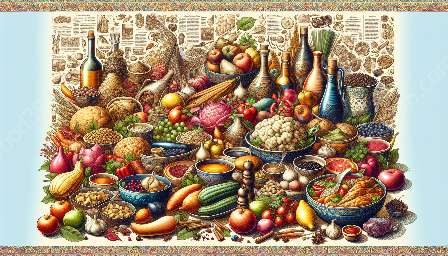Ancient civilizations held deep-rooted beliefs about food, from myths and legends that shaped cultural narratives to traditional rituals and the evolution of food culture. This exploration delves into the impact of ancient food-related myths and legends on cultural narratives and the intersection with ancient food traditions and rituals, as well as the origin and evolution of food culture.
Ancient Food-Related Myths and Legends: Shaping Cultural Narratives
Ancient societies attributed profound meanings to food, associating it with creation stories, fertility, and the divine. These beliefs formed the basis of food-related myths and legends that influenced cultural narratives. For example, the Greek myth of Demeter and Persephone explained the changing seasons through the story of the goddess of harvest and her daughter's time in the underworld, shaping agricultural practices and ceremonies in ancient Greece.
Similarly, in Norse mythology, the story of the Mead of Poetry depicted the significance of mead, a fermented beverage, in the pursuit of wisdom and poetic inspiration. These myths not only reflected the cultural values and beliefs of ancient societies but also influenced their culinary practices and social customs.
Ancient Food Traditions and Rituals: A Reflection of Myths and Legends
Ancient food traditions and rituals were intricately linked to the myths and legends prevalent in society. In many cultures, food was viewed as a symbol of spiritual connection and was central to religious ceremonies and communal gatherings. For instance, in ancient Egypt, the preparation and consumption of food were deeply intertwined with religious rituals and the belief in an afterlife, as evidenced by the elaborate funerary feasts and offerings found in tombs.
Furthermore, the act of communal dining held symbolic significance, with feasts often symbolizing social cohesion and divine favor. In ancient China, the tradition of offering sacrificial food in elaborate ceremonies reflected the belief in the interconnectedness of the spiritual and earthly realms, emphasizing the role of food as a conduit for maintaining harmony with the cosmos.
Origin and Evolution of Food Culture: Tracing Ancient Influences
The origin and evolution of food culture are deeply intertwined with ancient food-related myths and legends, as they provided the foundational narratives and practices that shaped culinary traditions. From the agricultural practices of early civilizations to the development of specific cuisines, the influence of myths and legends can be traced in culinary practices across different cultures.
For example, the Aztec myth of the maize god, Centeotl, underscored the significance of maize as a staple crop and influenced agricultural techniques and culinary customs in Mesoamerica. Similarly, the Hindu myth of the goddess Parvati and her association with rice contributed to the cultural importance of rice in Indian cuisine and religious ceremonies.
As societies evolved, the narratives and symbols embedded in food-related myths and legends continued to resonate in cultural practices, influencing culinary traditions, recipes, and dining etiquette. These influences contributed to the diverse array of food cultures that exist today, reflecting the enduring impact of ancient myths and legends on contemporary culinary experiences.


